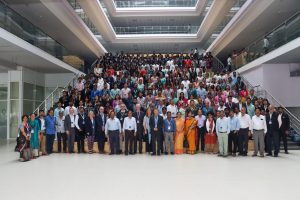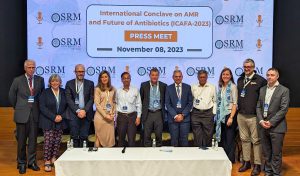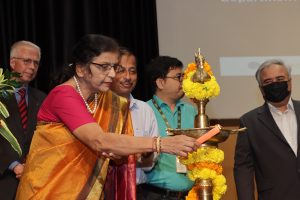Dr Anil K Suresh’s Work in Sustainable Nanoscience Lead his Scholar to Achieve Success
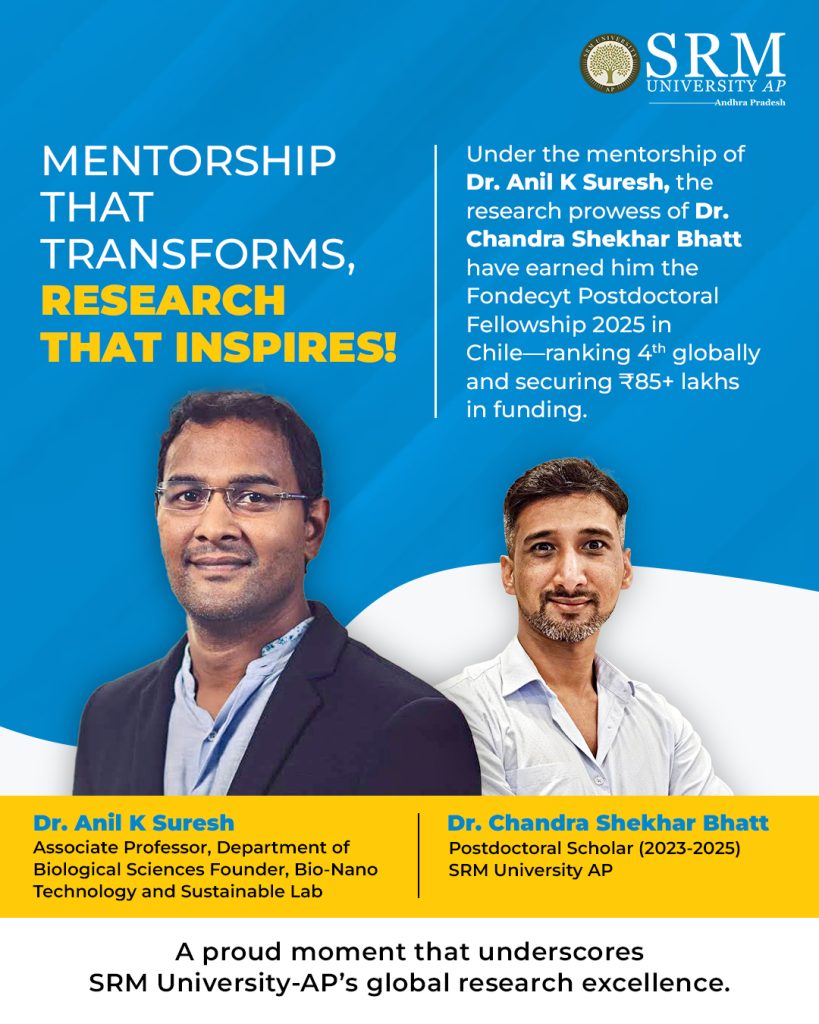
Dr Anil K Suresh, Associate Professor in the Department of Biological Sciences and Principal Investigator of the Bionanotechnology and Sustainable Lab, has achieved yet another feat with his ground-breaking work in sustainable nanoscience. His lab, committed to eco-conscious research, focuses on the sustainable synthesis of nanoparticles for applications in drug delivery, environmental remediation, and catalysis.
An outstanding accolade of his mentorship is the recent achievement of Dr Chandra Shekhar Bhatt, his former PhD student and Postdoctoral Scholar, who has secured the prestigious Fondecyt Postdoctoral Fellowship 2025 in Chile—ranking 4th globally and receiving over ₹85 lakhs in funding.
Under Dr Suresh’s guidance, their collaboration led to 12+ high-impact publications and global recognition, including features in C&EN, USA. Dr Suresh’s contributions span 64 Scopus-indexed papers, 27 book chapters, 4 books, 7 patents, and numerous fellowships and awards. Through his start-up, GreenGen Science Solutions, he champions scalable green innovations like the revolutionary “Jumbocatalyst” for hydrogenation reactions, “specfilm” for UV-spectroscopy, and “ultra-stable gold nanoparticles” transforming waste into eco-saving technologies.
Dr Anil K Suresh’s remarkable journey and the ripple effect of his visionary leadership inspire all researchers at the SRM AP community. Dr Chandra S Bhatt’s success in securing the prestigious fellowship is a testament to the high-quality research conducted at SRM AP.
- Published in Biology News, Departmental News, News, Research News
Expert Talk by Prof. Meenakshi Munshi
The Department of Biological Sciences at SRM University-AP organised an Expert Talk on “Various Funding Opportunities for Departments, Scholars, Postdocs, and Faculty of Life Sciences”. The event featured Prof. Meenakshi Munshi, Former Adviser/Scientist-G and Head of HRD & Societal Program Division at the Department of Biotechnology, Government of India.
The session had a turnout of participants and faculty members from various departments. The event, organised under the guidance of Dr Anil K Suresh, aimed to provide comprehensive information about the diverse funding landscape available to support research and academic initiatives in the life sciences domain.
During her presentation, Prof. Munshi offered a detailed overview of numerous funding sources accessible to researchers at different career stages. She expertly navigated through the complexities of eligibility criteria and application procedures, empowering attendees with practical knowledge and to identify and pursue appropriate funding opportunities. Prof. Munshi stressed on the importance of developing well-crafted research proposals and realistic budgets that align with the priorities of funding agencies, significantly increasing the chances of securing financial support.
One of the highlights of the session was Prof. Munshi’s emphasis on the value of collaborative research networks. She explained how strategic partnerships can strengthen funding applications and expand the scope and impact of research projects. This perspective encouraged participants to think beyond individual pursuits and consider the benefits of interdisciplinary collaboration, a principle that aligns perfectly with SRM University-AP’s research philosophy.
The event fostered intellectual discussions among participants, creating an environment conducive to knowledge sharing and networking. Students and faculty alike engaged with Prof. Munshi, seeking clarification on specific aspects of the funding process and sharing their experiences and challenges.
The talk built confidence in the participants’ ability to navigate the funding landscape. Armed with practical strategies for identifying suitable funding sources, understanding application requirements, crafting compelling proposals, and building collaborative networks, attendees are now better positioned to advance their research endeavours.
- Published in Biology News, Departmental News, News
From Mechanisms to Theory: Dr Siva Reddy Addresses Students of Biological Sciences
 The Department of Biological Sciences organised a significant expert talk titled “Senescence-Associated Cardiovascular Dysfunction: From Mechanisms to Therapies”, the talk was led by Dr Kotla Siva Reddy, Associate Professor, Department of Cardiology, Division of Internal Medicine, The University of Texas MD Anderson Cancer Center, Houston, TX, USA. This talk aimed at research scholars in the field explored the complex interplay between cellular senescence, cardiovascular health, and the adverse effects associated with cancer and HIV treatment drugs.
The Department of Biological Sciences organised a significant expert talk titled “Senescence-Associated Cardiovascular Dysfunction: From Mechanisms to Therapies”, the talk was led by Dr Kotla Siva Reddy, Associate Professor, Department of Cardiology, Division of Internal Medicine, The University of Texas MD Anderson Cancer Center, Houston, TX, USA. This talk aimed at research scholars in the field explored the complex interplay between cellular senescence, cardiovascular health, and the adverse effects associated with cancer and HIV treatment drugs.
The resource person, Dr Siva Reddy, with his extensive academic background in Biotechnology set the stage for discussions. Key topics of discussion included the molecular mechanisms underlying cardiovascular dysfunction linked to cancer and HIV therapies, particularly focusing on oxidative stress and endothelial dysfunction.
The event also fostered an interactive environment where scholars and students engaged in meaningful dialogues. Attendees gained crucial insights into how cellular senescence and foam cell formation contribute to atherosclerosis, thereby affecting cardiovascular health.
In conclusion, the event successfully facilitated rich discussions on the intersections of oncology, virology, and cardiovascular health. By focusing on innovative therapeutic strategies and the underlying mechanisms of cardiovascular diseases induced by treatment regimens, the event contributed significantly to enhancing the collective understanding and research efforts in the realm of cardiovascular aging.
- Published in Biology News, Departmental News, News, Research News
MoU with SHRI Opens New Pathways in Medicine
In an effort towards enhancing academic and research capabilities, SRM University-AP and Samishta Hospital and Research Institute (SHRI) formalised an understanding on scientific cooperation in biological sciences and other areas of mutual interest. The MoU signing ceremony that took place at SRM University-AP and was signed by Dr R Premkumar, Registrar- SRM University-AP and Dr Kalyan Chakravarthy, Managing Director-Samistha Hospital and Research Institute, Guntur in the presence of Dr Sandeep and Dr Ravi Teja, Dr Varun, Dr Ramakrishna, Dr Gnana Prakash Doctors from SHRI and Prof. C V Tomy, Dean-School of Engineering and Sciences; Prof. Ranjit Thapa, Dean-Research; Prof. Jayaseelan Murugaiyan, Associate Dean-Sciences (Admission Outreach and Research Collaborations); Assistant Professors at the Department of Biological Sciences-Dr Sutharsan Govindarajan, Dr Anil K Suresh, Dr Prateek Gupta among others.
The MoU will open pathways for collaborative opportunities in research and academics, fostering joint research projects and funding possibilities while also emphasising the importance of skill development through seminars organised by both the institutions.
Registrar Dr R Premkumar highlighted the significance of this partnership and the potential outcomes of the joint venture. Dr Sutharsan Govindarajan thanked the team from Samistha Hospitals and Research Centre for joining hands and taking the phase therapy from bench to bedside. This MoU between the two institutes of eminence aims to create a dynamic environment for innovative research that will benefit not just our institutions but also the society in general.
- Published in Biology News, Departmental News, MoU, News
Prof. Stefan Kalkhof on Advancing Biomaterial Design

The Department of Biological Sciences organised an expert talk on “Guiding Biomaterial Design Through the Power of Omics Technologies” by Prof. Stefan Kalkhof on February 05, 2025. Prof. Kalkhof, a distinguished member of the Faculty of Applied Natural Sciences, Coburg University of Applied Sciences, Germany, and Head of the Proteomics Research Group at the Fraunhofer Institute for Cell Therapy and Immunology (IZI), Germany, began the session with an introduction to Coburg University, highlighting its rich academic history and research contributions, followed by a brief overview of the Fraunhofer Institute for Cell Therapy and Immunology (IZI), which is dedicated to developing the medicine of the future through innovative research in cell therapy and immunology.
Prof. Kalkhof’s talk focused on the potential of mass spectrometry-based proteomics and its wide-ranging applications in biomedical research. He emphasised how this advanced technology helps study the structure and function of drug targets, develop cancer-specific drugs, design functional implants, understand bacterial infections, and assess the toxic effects of chemicals.
A significant part of the discourse revolves around bone implants and tissue regeneration. He explained that although bones naturally regenerate, certain conditions, such as Type 2 diabetes and other metabolic disorders, may need bioactive scaffolds to promote healing. These smart scaffolds are designed to stimulate active tissue regeneration.
Prof. Kalkhof also spoke about the importance of proteomics technologies in regenerative medicine. He highlighted how mass spectrometry at the protein level plays a crucial role in healing, diagnostics, and drug development. His discussion extended to bioactive functional implants, a field that offers vast opportunities for materials scientists, chemists, toxicologists, and medical researchers.
The session also covered clinical trials and experimental models used to evaluate bioactive scaffolds, including in vitro and in vivo characterisation, osteoblast cell culture models, and simulation experiments in animal models.
Towards the conclusion of his talk, Prof. Kalkhof provided insights into ongoing projects in regenerative medicine, emphasising the significance of comprehensive analysis for bio-resource-based bioactive scaffolds. He also acknowledged his core research team and their invaluable contributions to these projects. The lecture was followed by an engaging Q&A session, where students and faculty members posed insightful questions about proteomics, biomaterials, and regenerative medicine.
- Published in Biology News, Departmental News, News
Field Visit: Biological Sciences Students at AIIMS Mangalagiri
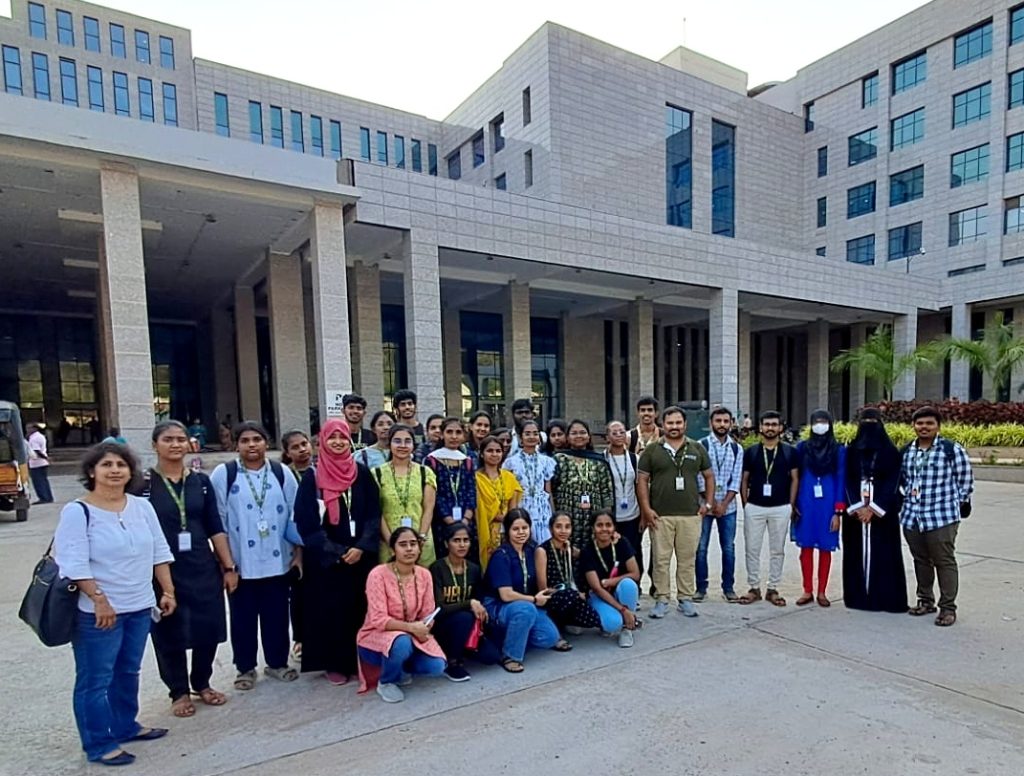
In a significant stride towards enriching their academic experience, students from the Department of Biological Sciences embarked on a captivating field trip to AIIMS Mangalagiri. This excursion served as an integral component of their Active Learning Process, fostering a deeper understanding of real-world applications in the realm of biology. The cohort comprised students from diverse academic backgrounds, including those pursuing 1st year B.Sc in Integrative Biology and M.Sc in Molecular Biology & Biotechnology. Their visit to AIIMS Mangalagiri provided them with a unique opportunity to gain firsthand insights into cutting-edge practices in the field of biomedicine.
During their visit, the students were granted exclusive access to the Integrated Stewardship and OPD Labs, where they were immersed in a world of advanced diagnostics and research methodologies. Expert lectures and demonstrations on state-of-the-art diagnostic techniques such as MALDI-TOF, CBNAAT, CLIA, Vitek, and BactAlert offered invaluable insights into the intricacies of disease detection and monitoring.
This excursion underscored the department’s commitment to fostering a culture of active learning and practical exposure among its students. By exposing them to prominent institutions and industries, such as AIIMS Mangalagiri, students were provided with hands-on training and the opportunity to engage with leading experts in the field.
Accompanying the students were esteemed faculty members of the department, including Dr Sutharsan Govindarajan, Dr Sudeshna Saha, and Dr Prateek Gupta, whose guidance and mentorship further enriched the learning experience.
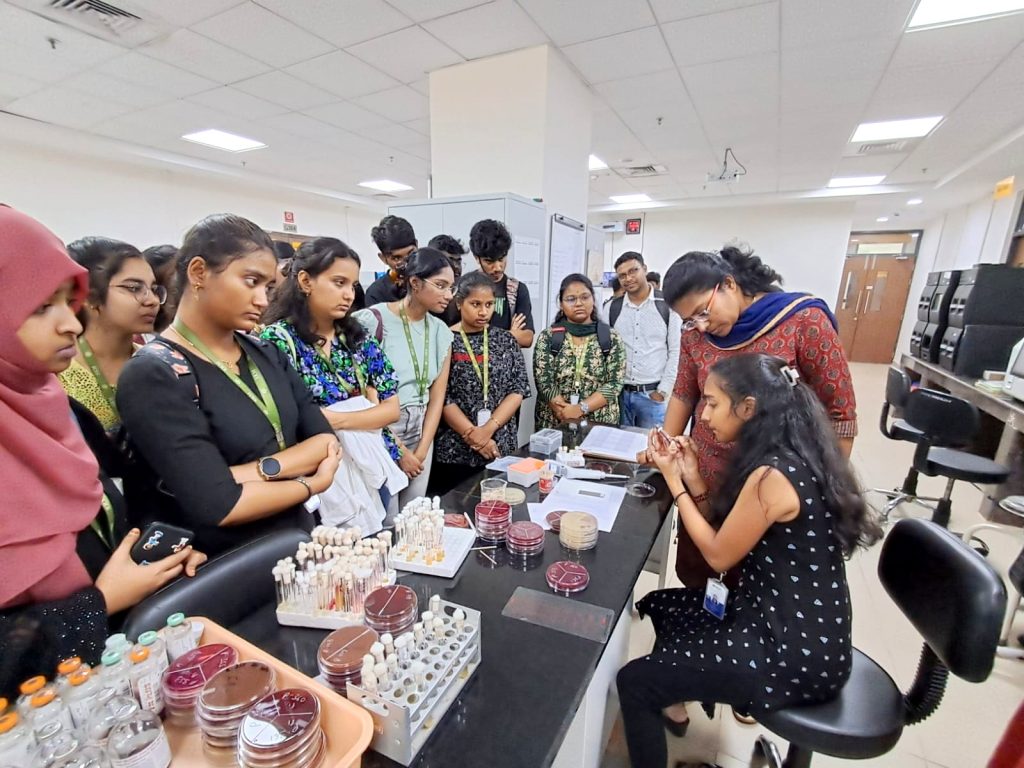
Furthermore, the collaborative efforts between the faculty of SRM University-AP and researchers at AIIMS Mangalagiri were highlighted during the visit. These collaborations span various domains, from developing biomedical devices for disease diagnosis to research endeavours in antimicrobial resistance (AMR), early cancer detection, and drug targeting. Such synergies between academia and research institutions present students with unparalleled opportunities to engage in impactful research initiatives and contribute meaningfully to the advancement of scientific knowledge
Overall, the field visit to AIIMS Mangalagiri served as a catalyst for academic excellence and professional growth, empowering students with the skills, knowledge, and networks necessary to thrive in the dynamic field of biological sciences.
- Published in Biology News, Departmental News, News
ICAFA 2023: Fight Against Antimicrobial Resistance
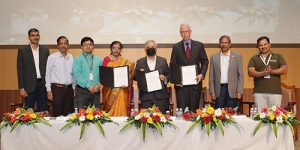 SRM University-AP successfully conducted a two-day International Conclave on Antimicrobial Resistance (ICAFA 2023) in collaboration with AMR Insights from The Netherlands, UK Innovate KTN, Global AMR Hub, Germany, Nitte (Deemed to be University), FABA and ICFAI where esteemed speakers and renowned researchers from across the world came together to address the critical issue of antimicrobial resistance and promote global health awareness.
SRM University-AP successfully conducted a two-day International Conclave on Antimicrobial Resistance (ICAFA 2023) in collaboration with AMR Insights from The Netherlands, UK Innovate KTN, Global AMR Hub, Germany, Nitte (Deemed to be University), FABA and ICFAI where esteemed speakers and renowned researchers from across the world came together to address the critical issue of antimicrobial resistance and promote global health awareness.
ICAFA 2023 acted as a premier platform for experts to share insights, exchange knowledge, and collectively develop actionable strategies to combat the pressing issue. The conclave proved to be a significant milestone in the field of healthcare by providing a common ground for multidisciplinary experts to engage in thought-provoking discussions like ways to make people aware of the right use of antibiotics and control measures to combat it. The event witnessed the presence of leading healthcare professionals, researchers, policymakers, and scientists like Dr Marteen Van Dongen, AMR Insights, Netherlands; Dr Simon Doherty, Queen’s University Belfast, UK; Dr Joanna Wiecek, CSO, CircaGene, UK; Dr Mandy Nevel, Head of Animal Health and Welfare, AHDB, UK; Dr Peter Coombs, LifeArc, UK; Dr Robin Cohen, Innovate UK; Prof. Ranga Reddy Burri, IFCAI, Prof Reddanna, FABD, Prof. Niyas Ahmed, Shanti Swarup Bhatnagar Fellow from the University of Hyderabad, Dr. Nagendra R. Hegde, NIAB and many more who showcased their expertise and shared groundbreaking research and measures in combating AMR. Acknowledging the pressing need for international collaboration and research to combat antimicrobial resistance, SRM University-AP extended its reach through a strategic partnership by signing an MOU with AMR Insights and NITTE (deemed to be the University).
In addition to the esteemed keynote address, an interactive panel discussion and press conference were organized, covering various aspects of antimicrobial resistance. The conference served as a platform for experts to make people aware of the emergence of drug-resistant infections, challenges in the reckless use of antibiotics, and innovative approaches to infection control because of the adverse effects.
Besides the main conference event on Thursday, three roundtables with themes on One Health, Therapeutics and Vaccines, and Diagnostics and Therapeutics were held, during which UK experts, Indian AMR researchers, experts from industry and startups, and representatives from the state medical colleges, AP government departments – health, animal husbandry, and Fisheries, discussed on the possibilities of UK- India collaboration efforts to combat AMR pathogens.
Concluding the International Conclave on Antimicrobial Resistance, dignitaries from SRM University-AP and other esteemed institutions released “10 Mantras to Combat Antimicrobial Resistant Microorganisms” These guidelines encapsulate the collective wisdom and recommendations of the experts present at ICAFA 2023, serving as a guiding light for healthcare professionals, policymakers, and the public in combating antibiotic resistance.
Prof. Manoj K Arora, Vice Chancellor, SRM University-AP, emphasized the institution’s commitment to addressing global health challenges and fostering interdisciplinary collaborations. Antimicrobial resistance is a complex issue that requires collective action. By hosting ICAFA 2023, SRM University AP aims to create a platform for fruitful discussions, research collaborations, and policy recommendations to combat this global health crisis.
Prof. Jayaseelan Murugaiyan, Associate Dean i/c (Sciences) SEAS and Head of the Biological Sciences Department, expressed his gratitude towards the participants and speakers for their contributions to this remarkable event. He stated, “ICAFA 2023 has provided us with a robust platform to collaborate, exchange ideas, and collectively address the challenges of antimicrobial resistance. We are confident that the knowledge shared and the strategies proposed during this conclave will pave the way for a healthier future.”
SRM University-AP’s successful organization of ICAFA 2023 demonstrates its commitment to fostering collaborative efforts in addressing global health challenges. By bringing together international experts and promoting public awareness, the university reiterates its dedication to advancing healthcare and finding tangible solutions to combat antimicrobial resistance.
- Published in Biology News, Departmental News, News, Research News
Biological Science Researcher bags DST INSPIRE Fellowship
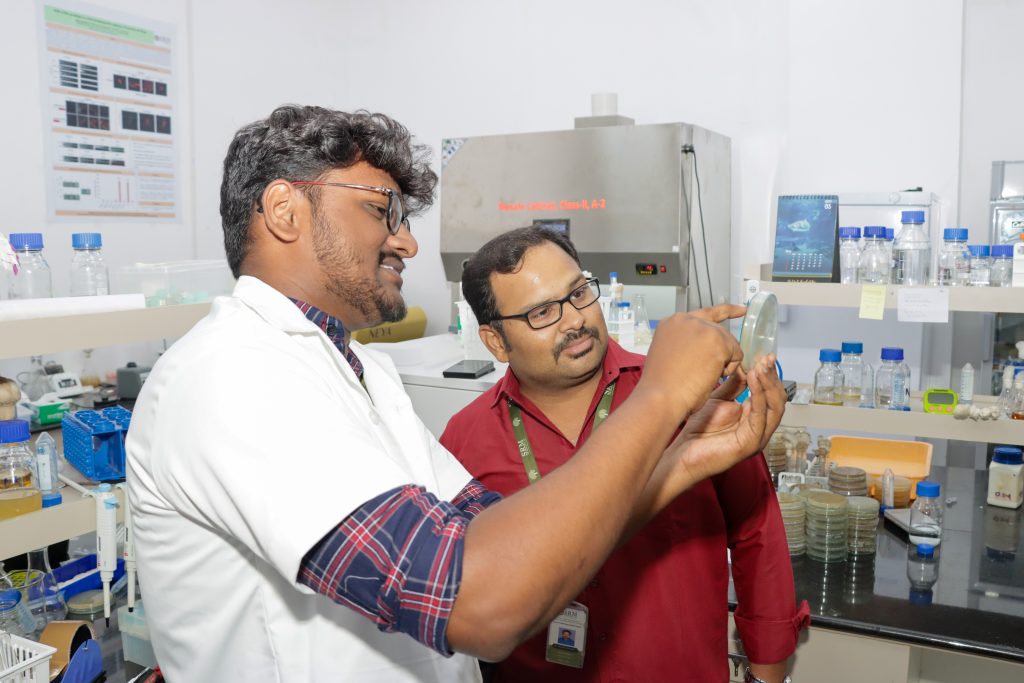
Barath Sivaraj, a research scholar from the Department of Biological Sciences at SRM University-AP has achieved an outstanding feat by receiving the DST INSPIRE Fellowship, a highly regarded programme sponsored and overseen by the Department of Science & Technology.
Sivaraj’s research focuses on exploring how bacteriophages, a type of virus that infects and reproduces inside bacteria, utilises the bacterial system. This research has earned Sivaraj the Fellowship, which runs for a duration of 5 years. The researcher also gets to carry out his research at any national or international laboratories other than their host institute for a period of 18 months.
Barath expresses his immense delight and pride in receiving this fellowship and considers it a significant milestone in his academic journey. Sivaraj explains that applicants must meet several criteria, such as being a top-ranked student in a full-time postgraduate science programme or a related field at the university level. Sivaraj credits his research supervisor, Dr Sutharsan Govindarajan, for guiding him through the application process. As a future prospect, Sivaraj plans to pursue his post-doctoral studies abroad and eventually wishes to offer his professional services at a reputable university.
We wish him all success!
- Published in Biology News, Departmental News, News, Research News
SRMAP faculty recognised by Stanford University among the top Biotechnologists
Dr Imran Pancha from the Department of Biological Sciences, SRM university – AP is recognised in Biotechnology among the top 2% scientists/researchers across the world By Stanford University Researchers. Recently an article has been published in PLOS Biology by Stanford University Researchers on the highly cited researchers in 22 different fields and their subfields. In the Biotechnology field, 1,074 scientists/faculty members were identified, and Dr Imran Pancha is one amongst them. From India, only 77 scientists/faculty members could achieve this honour, and Dr Imran Pancha is one among them. This is an admirable achievement for a young faculty from a nascent University to be in the top 2% scientists of the world. Dr P Sathyanarayanan, the President of SRM University-AP honoured Dr Pancha for bringing this scientific laurel to the university.
Overall, of the top 160,000 scientists from different fields of Science & Technology, India hosts 2,313 scientists/faculty members. This list comprises of the prominent and illustrious scientists from India.
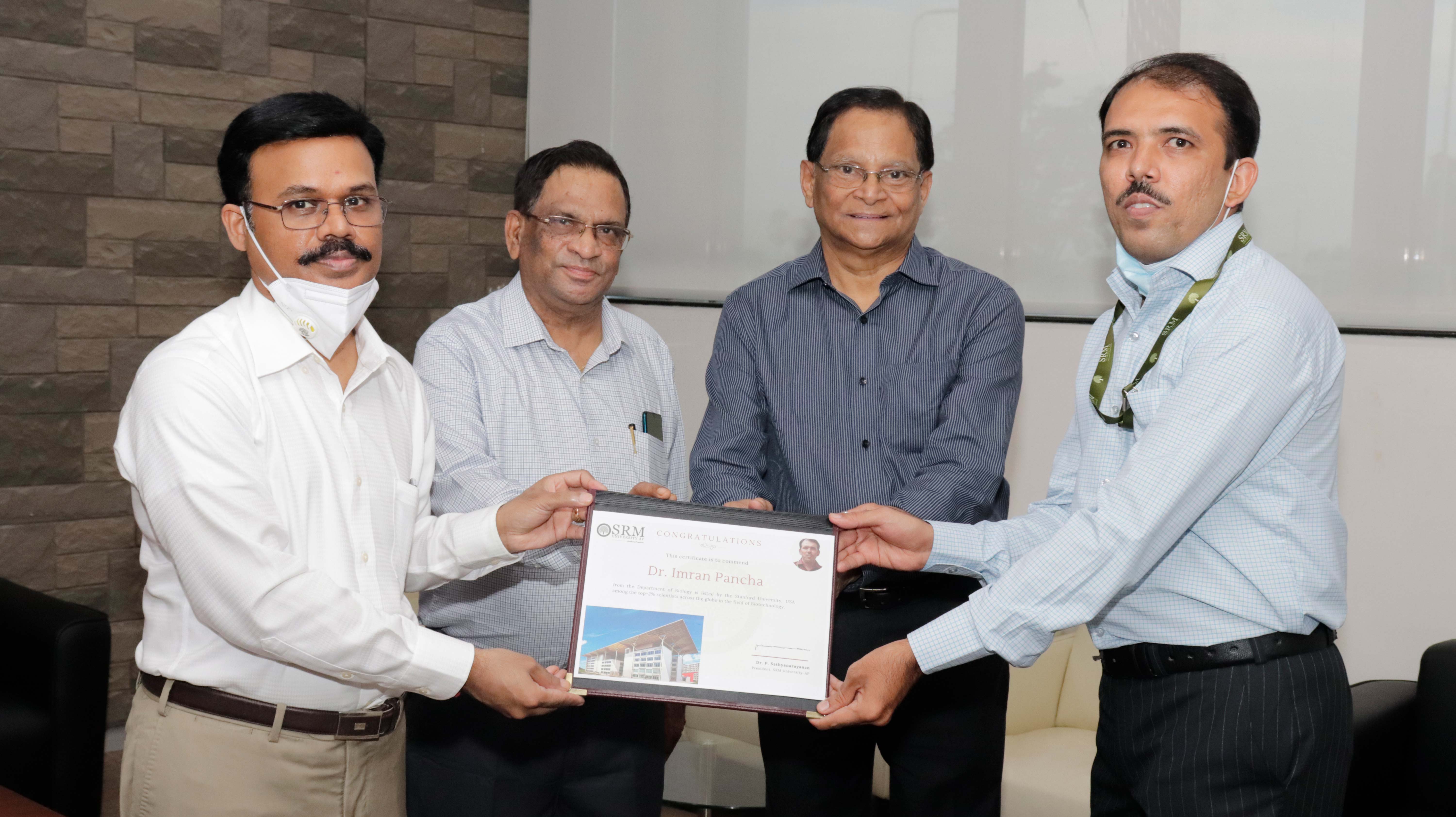
Dr Imran Pancha is a young researcher working as an Assistant Professor in the Department of Biological Sciences in SRM University-AP, Andhra Pradesh. He has obtained his doctoral degree from CSIR-Central Salt and Marine Chemicals Research Institute-Bhavnagar after graduating from Bhavnagar University. He has also worked as a post-doctoral fellow at Japanese Society for Promotion of Science, Japan before joining SRM University-AP.
Dr Pancha’s primary research focus is to produce renewable energy from microalgae. His team is trying to develop integrated microalgal bio-refinery to produce high-value compounds like phycobiliproteins, carotenoids along with biofuel and bio-fertilisers from microalgae. Apart from this, he is also interested to understand algal-bacterial interaction, particularly isolate and characterise the microalgae associated bacteria and finding their role in growth enhancement and inhibition in microalgae.
- Published in Biology News, News, Research News
ICMR-NIN Scientist on the Dietary Risk Factors for NCDs
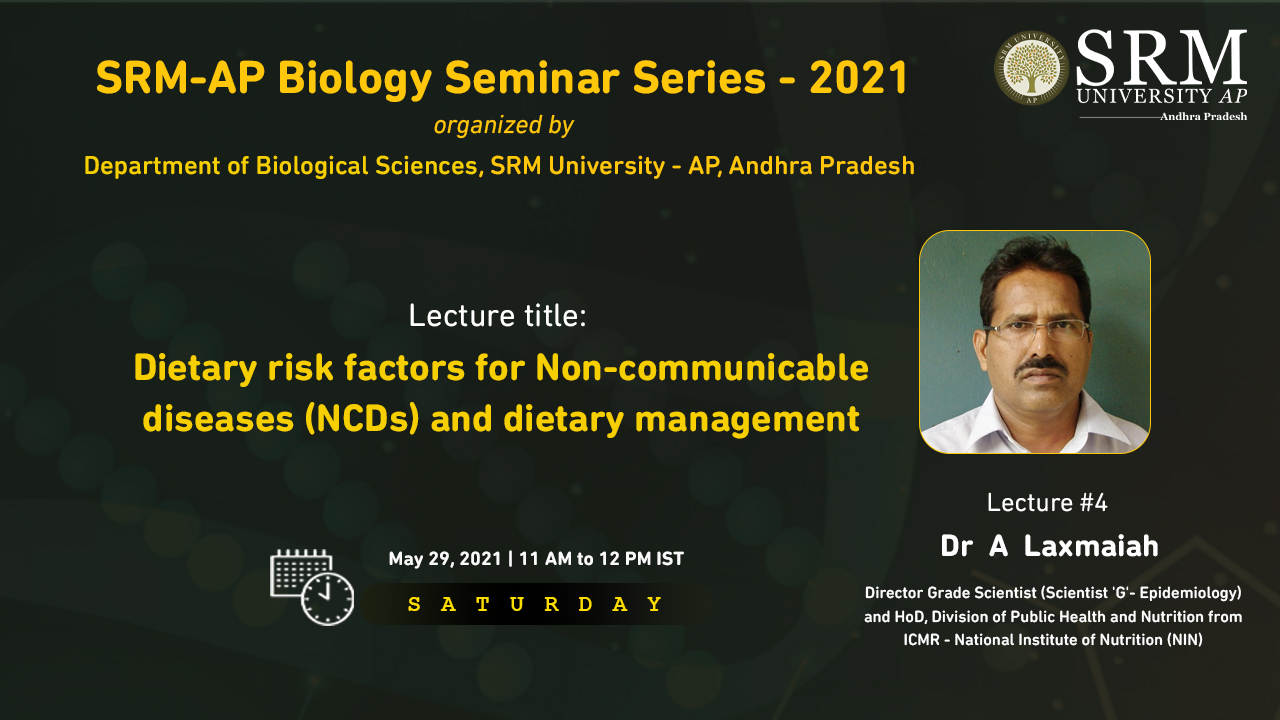 A profound and astute fourth edition of the Biology Seminar Series on the theme “Dietary Risk Factors for Non-communicable Diseases (NCDs) and Dietary Management”, which was held on May 29, 2021, addressed the vital questions on factors contributing to the rise in non-communicable diseases. Dr A Laxmaiah, Director Grade Scientist (Scientist ‘G’- Epidemiology) and HoD, Division of Public Health and Nutrition from ICMR – National Institute of Nutrition (NIN), elucidated on the topic and discussed the role of nutrition in alleviating such risks.
A profound and astute fourth edition of the Biology Seminar Series on the theme “Dietary Risk Factors for Non-communicable Diseases (NCDs) and Dietary Management”, which was held on May 29, 2021, addressed the vital questions on factors contributing to the rise in non-communicable diseases. Dr A Laxmaiah, Director Grade Scientist (Scientist ‘G’- Epidemiology) and HoD, Division of Public Health and Nutrition from ICMR – National Institute of Nutrition (NIN), elucidated on the topic and discussed the role of nutrition in alleviating such risks.
Dr Laxmaiah stated that almost 38% of children in India are stunted and over 21% are wasted, which is a very alarming statistic. He also noted that, according to reports, more than 60% of the country’s population suffers from iron deficiency, as well as other serious vitamin deficiencies. According to him, a 2016 study discovered that almost 5.8 million people die in India each year because of non-communicable ailments. Dr Laxmaiah stated that the rise in NCDs is primarily due to smoking, physical inactivity, harmful alcohol consumption, and unhealthy diet. The poor dietary intake among Indians was identified as an alarming issue and he further highlighted the need for individuals to adhere to a traditional diet rich in vitamins and minerals. The session was aimed to raise community awareness on the risk factors for non-communicable disease and the urgency of taking action to address the growing concern of NCDs.
Upon the completion of the lecture, an interactive discussion session followed with the topic overview, providing participants with an opportunity to ask in-depth questions.
Pre-Event Release: https://srmap.edu.in/events/biology-seminar-series-04/
- Published in Biology News, News









